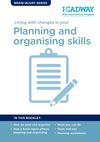
Get the booklet
Download Living with Changes in your Planning and Organising skills in pdf format
Planning and organising are the skills we use to think about tasks and carry them out effectively. We plan and organise things in order to achieve a goal.
People use planning and organising skills every day to get things done. We also use them to organise bigger events such as holidays.
Here, we explain the brain’s role in how we plan and organise and how a brain injury can affect these skills. We also suggest some tips and tools which you may find useful.
The tips and tools are based on research and people’s own experiences. Because everyone’s brain injury affects them slightly differently, some of the suggestions will work for you – others won’t. Try them out and use the ones you find helpful.
Since my brain injury, it takes me ages to get out of the house in the morning. I get annoyed at myself for being so slow
Simon from Tipperary
How we plan and organise
We usually take the steps below when we have something we want to achieve – a goal. We carry out a task, or a number of tasks, in order to achieve this goal.
- Planning – deciding what we need to do in order to achieve the goal.
- Initiating – getting started on the task.
- Sequencing – doing things in the right order.
- Finishing the task – achieving the goal.
Task example: Cooking a meal.
| Step One: Planning | Decide what to cook. |
| Step Two: Initiating | Gather ingredients and cooking utensils. |
| Step Three: Sequencing | Follow the recipe step-by-step. |
| Step Four: Finishing | Serve the meal. |
How a brain injury affects planning and organising skills

The Frontal Lobes of the brain play an important role in our ability to plan and organise. We have two frontal lobes, one left and one right.
The Frontal Lobes act like ‘managers’ to other parts of the brain. They are very important in helping us to get things done. The Frontal Lobes also allow us to change what we are doing when we notice something is not going according to plan. So, an injury to this area of the brain, often impacts on our ability to plan and organise.
We also use a number of other thinking skills when completing tasks, as well as the specific planning and organising skills mentioned above. For example, if your brain injury has affected your attention or memory, this can also impact on your ability to get tasks done.
Common difficulties with planning and organising
After a brain injury, many people experience problems with:
- Planning meals, shopping and cooking.
- Planning their day and getting tasks done.
- Keeping things organised at work or at home – for example: dealing with emails, bills and other documents.
- Bigger tasks – for example: planning a holiday or doing DIY projects at home.
Everyone’s brain injury affects their planning and organising skills slightly differently. You might find you can still get some tasks done easily, but find others are harder than before. Also tiredness or stress can make any difficulties worse.
If you would like to find out more about your particular planning and organising difficulties, a Psychologist or Occupational Therapist can advise you. They can assess a range of your thinking skills and suggest specific approaches that may help. See Help and information tab below for contact details.
Try to keep your home or workplace tidy. This will help prevent you getting distracted by clutter. A tidy environment can also reduce the frustration of frequently having to look for things.
What you can do

General advice
- Follow a routine. Try to have a regular time each day when you make plans for the next day.
- When you are planning your day, try to be realistic about how many tasks you can get done. You may need more time for each task than you did before your injury.
- Do important tasks when you are at your freshest.
- Take regular breaks.
- Try to finish one task before starting another one.
If a task is taking too long or it is not going well, ask yourself:
- Do you need to take a break?
- Do you have all the equipment and information you need?
- Can you change the way you are doing the task?
- Do you need to ask for help or advice?
Steps for planning a task:
- Think about the task and write down:
• What goal you want to achieve
• What you need to do
• Things you need, such as equipment or information. - Break down the task into steps. If you are not sure what the steps are, ask for advice or do a search on the internet.
- Write the steps down.
- Tick off each step as you complete it.
- If a task is taking too long or is not going well, stop and ask yourself why.
- After you finish the task, ask yourself:
• Did I achieve my goal?
• What went well or not so well?
• What will I do differently next time?

Tools that can help
| An organiser | Using an organiser can help. You can get a My organiser from Headway. It includes a Diary, a Day Planner, a Task Planner and an Appointment Planner. Phone Headway on t: 1800 400 478 to get one. |
| Diary and Calendar | Put your appointments into your diary or your phone. Note the date and time, who you are meeting and where. Get into the habit of checking every morning to see what is coming up that day. Use a wall calendar, as well as a diary or phone, to keep track of your appointments. The calendar will also be helpful to other people who need to know what you have planned. |
| Electronic Devices | All smart phones and computers have electronic calendars. You can use the electronic calendar to set reminders for appointments and events. Use apps for making lists or checklists. New apps are being developed all the time. Do an internet search for ‘Task planning apps’. Try free services such as iCloud or OneDrive. If you use a service like this, your phone’s calendar and contacts will be kept safe even if you lose your phone or get a new one. |
| Organising your paper documents | Get a ring binder folder, a hole puncher and some subject dividers. Use the subject dividers for each section you want in the folder – for example: ‘Medical Reports’, ‘Appointment Letters’ or ‘Bank Statements’. Put your documents into the relevant section of the folder. When the folder starts getting too full, move older documents into a file box or dispose of those you do not need. |
| Managing Bills | Set up your household bills for automatic payment by Direct Debit. This will save you having to remember them. If you are not paying by Direct Debit, pay the bill on the day you receive it or put a reminder in your phone or diary when to pay it. When you pay a bill, write the date it was paid on it. Then put the bill away in a file or folder. |
| Lists | To-do Lists: Write down a list of things you want to do each day or put them into your phone. Put the most important things first. Tick the items off as you finish them. Shopping Lists: Keep a notepad for shopping lists handy. Then you can add items to the list as soon as you think of them. Checklists: Write a list of things you need to do to complete a task and tick them off. For example — when leaving the house: 1. Close any open windows. 2. Lock back door. 3. Get phone, keys and bag. 4. Set house alarm. 5. Lock front door. |

Set up a convenient place as your Home information centre. If you keep your wall calendar, notebooks, to-do lists and phone, all in the one place, you won’t have to go looking for them when you need them.
Summary of key points
- Planning and organising are the skills we use to think about tasks and carry them out effectively. We plan and organise in order to achieve a goal.
- A brain injury can affect these skills, particularly if the injury is to the Frontal Lobes of the brain.
- Using tools like a diary, reminders in your phone, checklists and planners, can help.
- Follow a routine. Try to have a regular time each day when you make plans for the next day.
- Do important tasks when you are at your freshest and take regular breaks.
- Try to finish one task before starting another.
- If a task is not going well, stop and ask yourself if you can change how you are doing it.
If you have difficulty with applying for social welfare entitlements, grants or public services, contact your local Citizens Information Centre for advice and assistance with forms. Lo-call t: 0818 07 4000. You can also request assistance from the Access Officer in any public organisations you are applying to. See Help and information tab below for more details.
Planning worksheets
Download a selection of planning worksheets here.

My Organiser 2023
Download My Organiser in pdf format

Day Planner
Download Day Planner in pdf format

Appointment Planner
Download Appointment Planner in pdf format

Contact Sheets
Download Contact Sheets in pdf format
Help and information
Psychologists
Headway offers free community-based brain injury assessment, counselling and rehabilitation in Cork, Dublin, Kerry and Limerick. t: 1800 400 478 .
To access a public psychologist, your GP or Public Health Nurse can refer you. HSE t: 1800 700 700 or visit www.hse.ie
To find a registered private psychologist, contact the Psychological Society of Ireland. t: 01 472 0105 or visit www.psychologicalsociety.ie
Occupational Therapists
To access a public Occupational Therapist, contact your local HSE Health Office or Health Centre. HSE t: 1800 700 700 or visit www.hse.ie
To find a private Occupational Therapist, contact the Association of Occupational Therapists of Ireland. t: 01 874 8136 or visit www.aoti.ie.